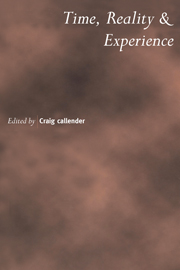Book contents
- Frontmatter
- Contents
- Preface
- Notes on Contributors
- When Time Gets Off Track
- Burbury's Last Case: The Mystery of the Entropic Arrow
- Zeno's Arrow and the Significance of the Present
- Presentism, Ontology and Temporal Experience
- A Presentist's Refutation of Mellor's McTaggart
- Time and Degrees of Existence: A Theory of ‘Degree Presentism’
- McTaggart and the Truth about Time
- On Absolute Becoming and the Myth of Passage
- Time Travel and Modern Physics
- Freedom from the Inside Out
- On Stages, Worms and Relativity
- On Becoming, Cosmic Time and Rotating Universes
- How Relativity Contradicts Presentism
- Can Physics Coherently Deny the Reality of Time?
- Rememberances, Mementos, and Time-Capsules
How Relativity Contradicts Presentism
Published online by Cambridge University Press: 05 May 2010
- Frontmatter
- Contents
- Preface
- Notes on Contributors
- When Time Gets Off Track
- Burbury's Last Case: The Mystery of the Entropic Arrow
- Zeno's Arrow and the Significance of the Present
- Presentism, Ontology and Temporal Experience
- A Presentist's Refutation of Mellor's McTaggart
- Time and Degrees of Existence: A Theory of ‘Degree Presentism’
- McTaggart and the Truth about Time
- On Absolute Becoming and the Myth of Passage
- Time Travel and Modern Physics
- Freedom from the Inside Out
- On Stages, Worms and Relativity
- On Becoming, Cosmic Time and Rotating Universes
- How Relativity Contradicts Presentism
- Can Physics Coherently Deny the Reality of Time?
- Rememberances, Mementos, and Time-Capsules
Summary
Introduction
But this picture of a ‘block universe’, composed of a timeless web of ‘world-lines’ in a four-dimensional space, however strongly suggested by the theory of relativity, is a piece of gratuitous metaphysics. Since the concept of change, of something happening, is an inseparable component of the common-sense concept of time and a necessary component of the scientist's view of reality, it is quite out of the question that theoretical physics should require us to hold the Eleatic view that nothing happens in ‘the objective world’. Here, as so often in the philosophy of science, a useful limitation in the form of representation is mistaken for a deficiency of the universe
(Black, 1962).The theory of relativity has excited more philosophical commentary, and exerted more influence in mainstream philosophy, than any scientific theory, with the possible exception of Newton's theory of gravity. But it is a remarkable fact that its influence on metaphysics proper has been somewhat marginal. That is probably a testimony to the anti-metaphysical attitude that characterized so much philosophy in the last century, certainly in the Anglo-American tradition, and certainly among more scientifically-minded philosophers. Although the hey-day of logical empiricism is longsince past, philosophers of physics have continued to remain cool to metaphysics. Since they remain the ones best suited to explain the implications of relativity theory for the philosophy of time, if they find no interesting links between these disciplines, metaphysicians are unlikely to look for them.
- Type
- Chapter
- Information
- Time, Reality and Experience , pp. 277 - 292Publisher: Cambridge University PressPrint publication year: 2002
- 23
- Cited by

